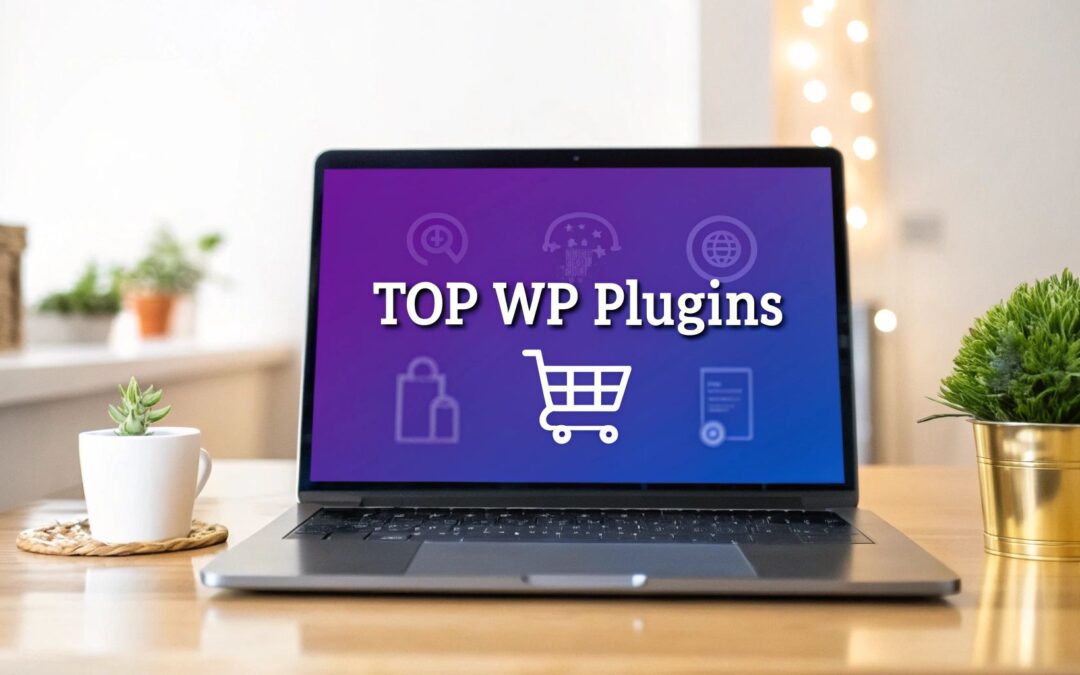Building a successful ecommerce store on WordPress requires more than just a great theme; it demands a powerful toolkit of plugins to handle everything from payments and shipping to marketing and user experience. With thousands of options available, pinpointing the right combination can feel overwhelming. This guide cuts through the noise to highlight the best WordPress plugins for ecommerce, selected for their reliability, robust feature sets, and real-world performance. The right plugins solve critical business problems by automating complex tasks, enhancing the customer journey, and ultimately, driving sales.
Whether you're selling physical products, digital downloads, or exclusive memberships, the tools in this list provide the essential functionality needed to build, manage, and scale your online business effectively. We will dive deep into each option, providing a clear overview, practical use-case scenarios, and honest assessments of their pros and cons. Each entry includes direct links and screenshots to help you evaluate the solutions for your specific needs. Our goal is to equip you with the knowledge to make informed decisions, ensuring you choose the perfect plugins to create a seamless and profitable online store. This curated resource is designed for web designers, developers, and e-commerce managers looking to optimize their WordPress and WooCommerce setup without the guesswork.
1. Divi Areas Pro — The Ultimate Divi Extension
For WordPress users building with the Divi theme, Divi Areas Pro is a transformative tool that redefines on-site visitor engagement. This premium plugin moves beyond simple popups, offering a comprehensive suite of dynamic content tools including fly-ins, tooltips, and targeted inline content injections. It's a powerhouse for creating sophisticated marketing campaigns directly within the Divi ecosystem, making it one of the best WordPress plugins for ecommerce stores aiming for precision and creativity.
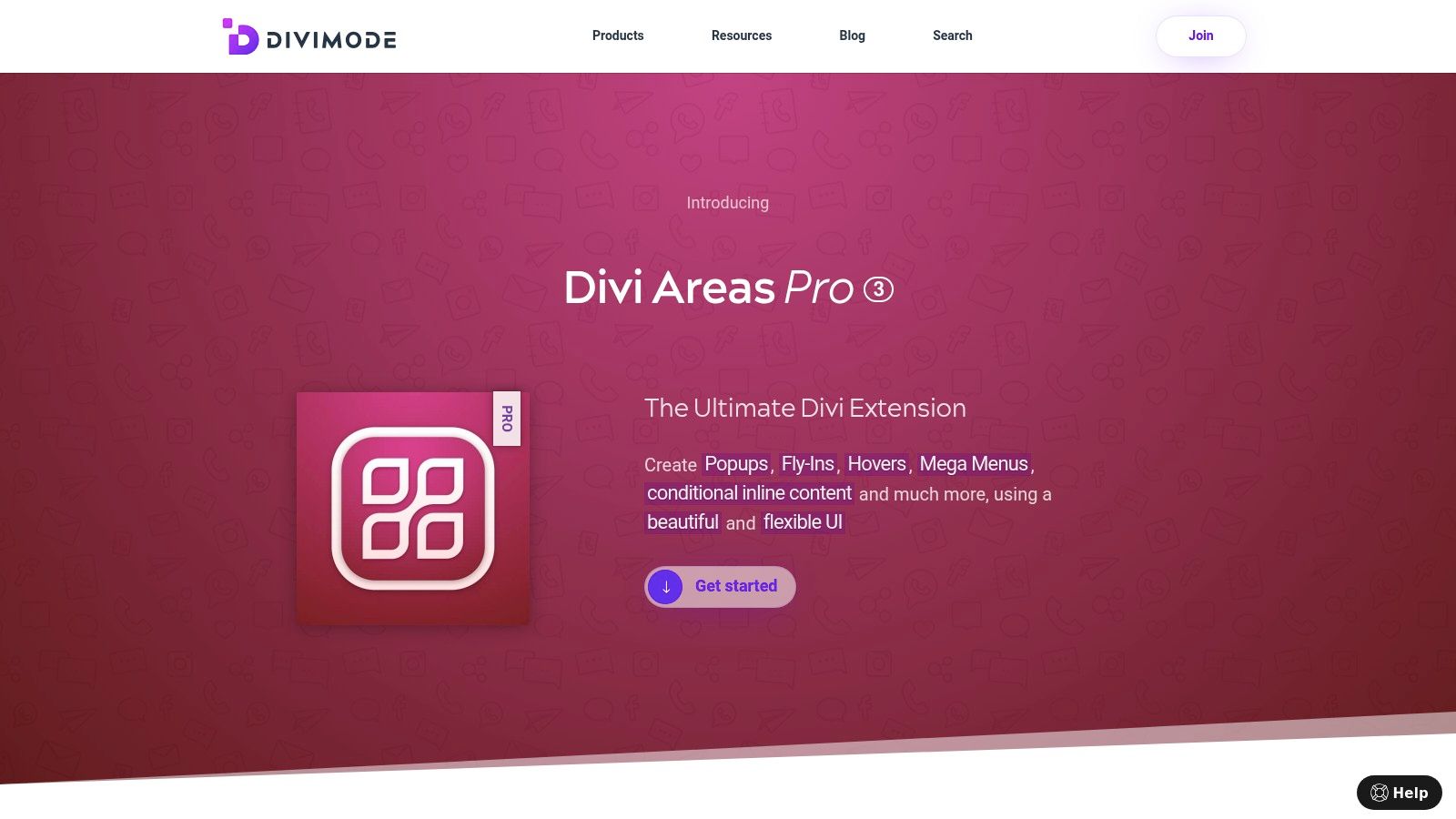
What truly distinguishes Divi Areas Pro is its deep integration with WooCommerce. This synergy allows you to execute advanced e-commerce strategies that directly boost conversions. For instance, you can trigger a targeted popup with a unique coupon code when a user shows exit intent on the checkout page, or display a cross-sell offer as a subtle fly-in when a specific item is added to the cart. These tailored interactions are made possible by an exceptionally flexible set of triggers.
The plugin provides granular control over when and where your content appears. You can define triggers based on scroll depth, user role, specific URLs, device type, and even advanced conditions like back-button detection. This level of precision ensures your promotional messages are timely and relevant, not intrusive.
Key Features & Use Cases
- Advanced Triggers: Deploy messages based on exit-intent, time on page, scroll depth, and user actions. This is perfect for cart abandonment recovery or last-minute offers.
- WooCommerce Integration: Create highly specific rules for displaying content. For example, show a "free shipping" banner only when a user's cart total exceeds a certain amount.
- Seamless Divi Experience: Build your dynamic content directly with the Divi Builder, ensuring brand consistency and a familiar workflow. If you want to see how to fully leverage this, check out this guide on how to create an online store with Divi and WooCommerce.
Pros & Cons
- Pros: Highly flexible targeting and trigger options, deep WooCommerce integration for advanced e-commerce strategies, seamless compatibility with Divi themes, and an extensible API for custom development.
- Cons: As a premium plugin, its cost might be a barrier for users on a tight budget. The advanced trigger configurations may also present a learning curve for beginners.
Website: https://divimode.com/divi-areas-pro/
2. WordPress.org Plugin Directory
The official WordPress.org Plugin Directory is the essential starting point for any e-commerce project. It's the central, trusted repository where you can find and vet thousands of free plugins, including the foundational WooCommerce plugin itself and countless add-ons to enhance its functionality. This directory isn't just a download center; it's a vital research tool for developers and store owners.
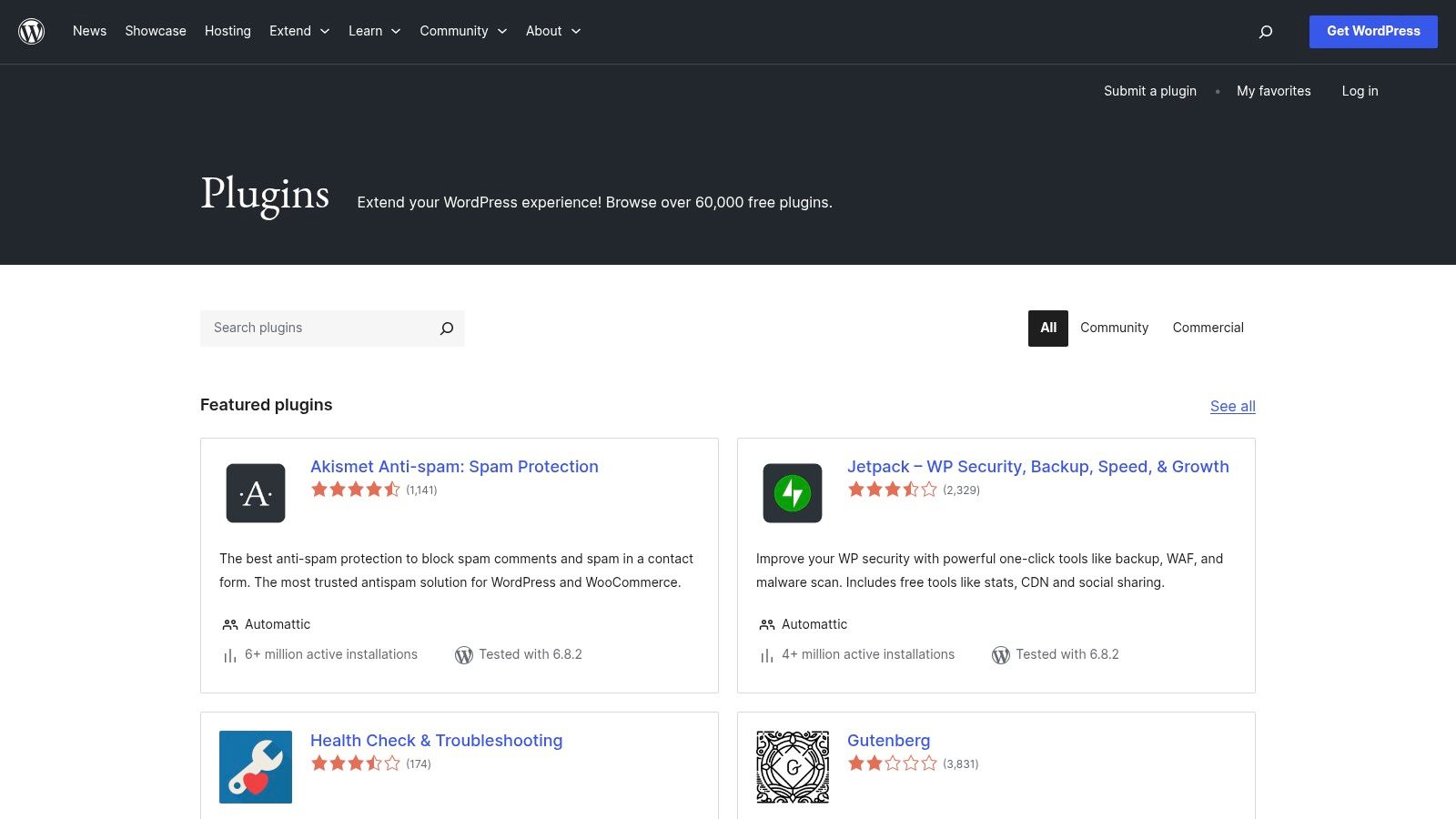
Its primary value lies in transparency. Every plugin listing shows active installations, the last update date, user ratings, and a public support forum. This data provides immediate insight into a plugin's health and reliability before you even install it, a crucial step for finding the best WordPress plugins for e-commerce that won't compromise your site's security or performance.
Key Features & Assessment
- Free Access: All plugins listed are free to download and install, making it a zero-cost environment for testing core functionalities.
- Vetting Information: The directory provides transparent metrics like version history, active installs, and public reviews, helping you gauge a plugin's quality and maintenance level.
- Security: Plugins undergo a strict review process before being listed, offering a baseline level of security assurance.
Pros:
- Completely free to access and download plugins.
- Transparent data helps assess plugin reliability and popularity.
- One-click installation directly from your WordPress dashboard.
Cons:
- Plugin quality can vary significantly.
- Advanced features often require upgrading to a paid version from the developer's site.
- Some plugins may be outdated or poorly supported.
Website: https://wordpress.org/plugins/
3. WooCommerce.com Marketplace (Woo Marketplace)
The official WooCommerce.com Marketplace is the primary commercial hub for extending your e-commerce store. Curated directly by the creators of WooCommerce (Automattic), it offers premium extensions and themes that have been vetted for quality, security, and compatibility. This marketplace is the go-to source when you need mission-critical functionality with the assurance of official support.
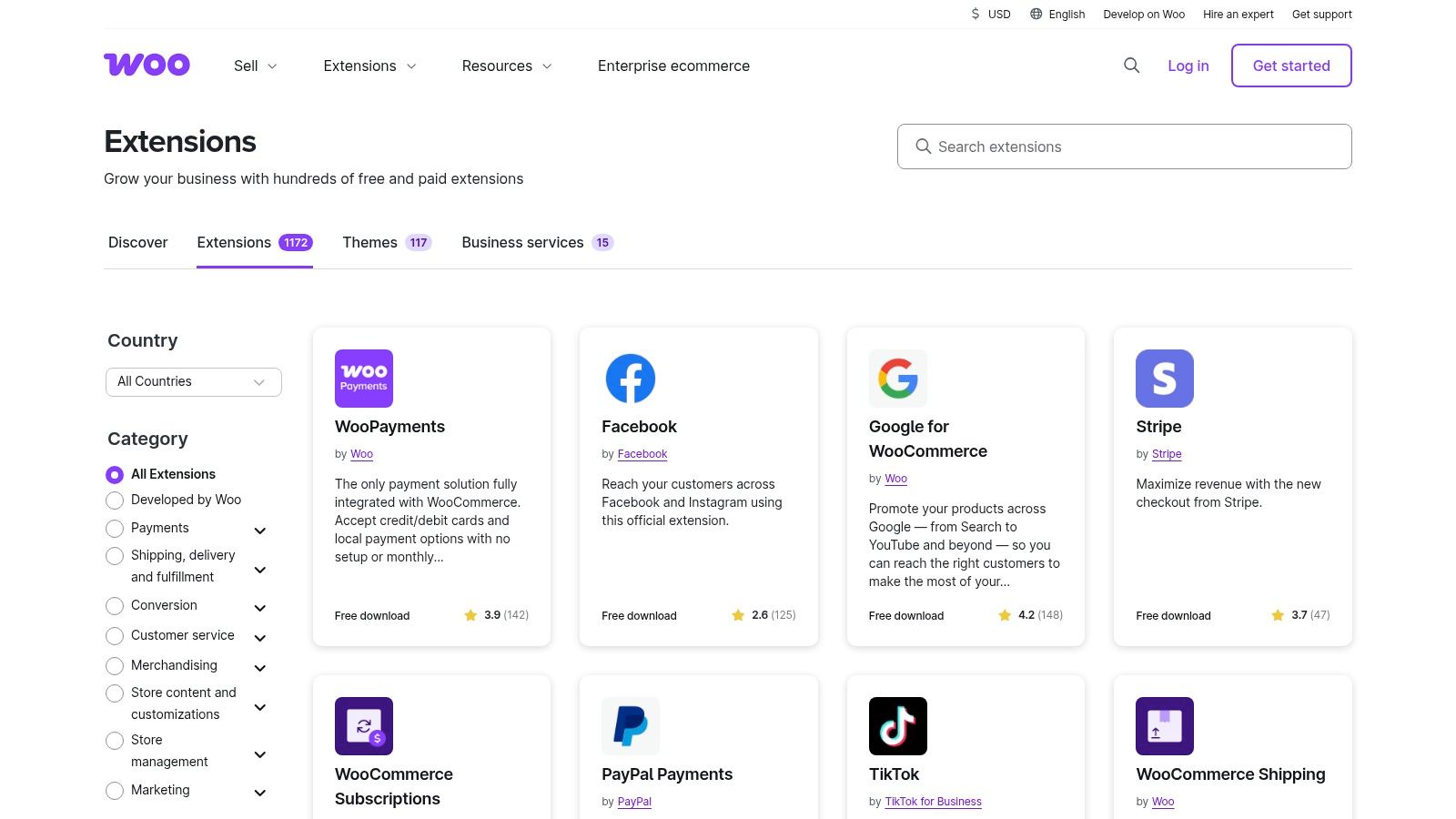
Unlike the free-for-all nature of the general WordPress directory, the Woo Marketplace provides a more controlled environment. Each extension comes with detailed documentation and a 30-day money-back guarantee, reducing the risk of investing in a tool that doesn't fit your needs. For anyone serious about building a robust online store, this is where you find the most reliable and powerful best WordPress plugins for e-commerce.
Key Features & Assessment
- Quality & Compatibility: All extensions undergo a strict review process, ensuring high standards and seamless integration with the core WooCommerce plugin.
- Centralized Support: Purchases are backed by official support and a 30-day money-back guarantee, providing a reliable safety net for your investment.
- Comprehensive Categories: The marketplace covers essential e-commerce functions, including payments, shipping, subscriptions, marketing, and multi-channel integrations.
Pros:
- Highest compatibility assurance with the core WooCommerce platform.
- Centralized management of licenses, updates, and support tickets.
- Extensions are well-documented and officially vetted.
Cons:
- Generally higher priced compared to third-party marketplaces.
- Annual renewals are required to continue receiving support and updates.
- Selection is curated, so it may not be as extensive as the wider plugin ecosystem.
Website: https://woocommerce.com/marketplace/
4. CodeCanyon (Envato Market)
CodeCanyon is a massive digital marketplace offering a vast collection of premium WordPress plugins and scripts. For e-commerce store owners, it’s a treasure trove of specialized WooCommerce extensions, often filling niche functionality gaps that larger developers overlook. You can find everything from unique payment gateways and advanced shipping calculators to intricate product customizers and dynamic pricing rules.
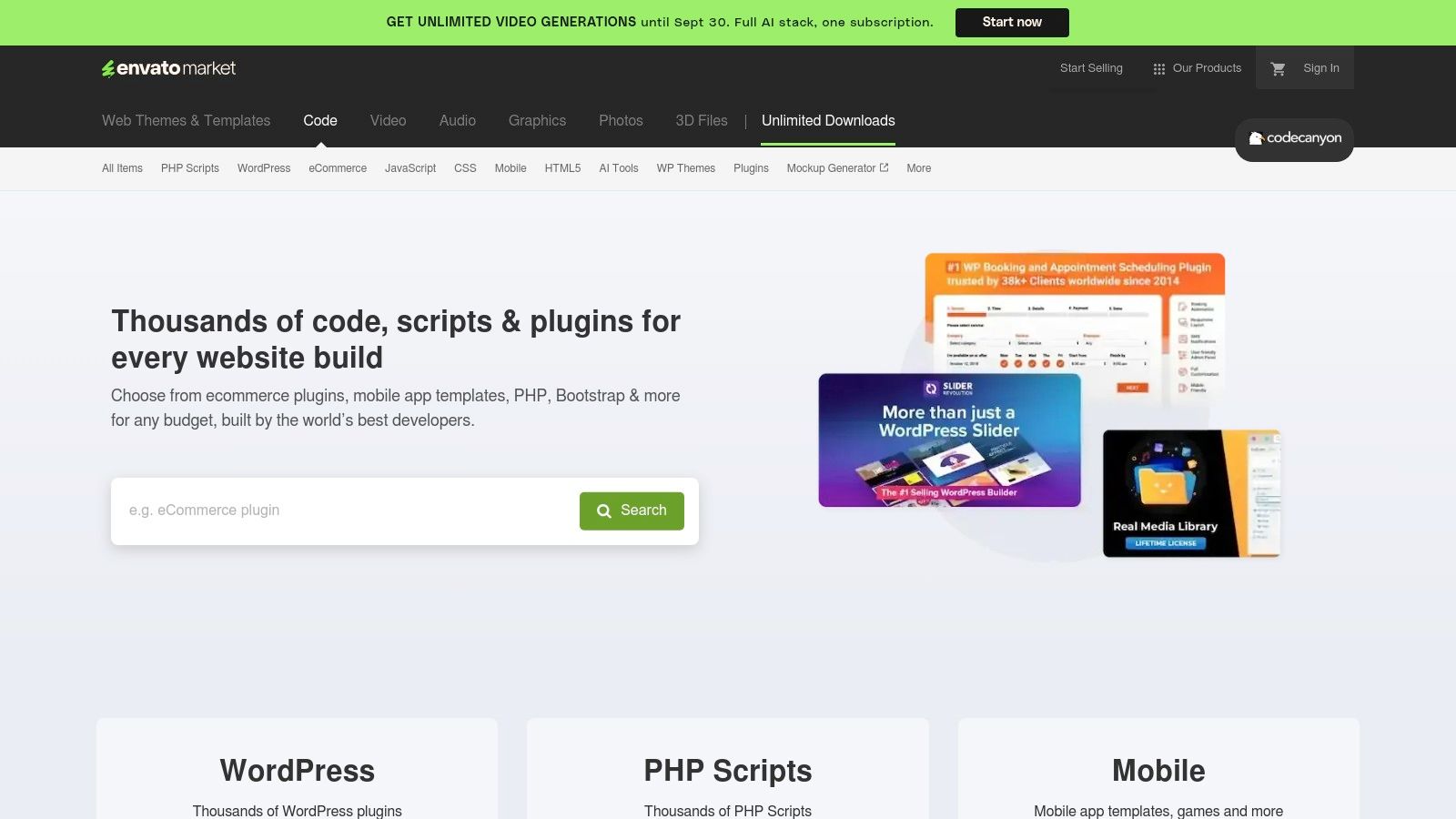
The platform's primary strength is its sheer variety and competitive pricing, typically based on a one-time license fee. Each plugin page provides sales data, user reviews, and public comments, offering social proof to help you vet options. Finding the best WordPress plugins for e-commerce on CodeCanyon requires careful research, as quality can vary, but the potential to find the perfect, affordable tool for a specific job is unparalleled.
Key Features & Assessment
- Massive Plugin Catalog: A huge library of premium plugins, including many specifically designed as WooCommerce add-ons for unique use cases.
- Transparent Metrics: Product pages show sales counts, user ratings, changelogs, and public Q&As to help you assess an item's history and support level.
- One-Time Pricing: Most plugins are sold with a one-time license fee, which includes a set period of developer support (usually 6 months), making it a cost-effective option.
Pros:
- Broad selection of plugins, including many for niche functionalities.
- Often a lower up-front cost compared to subscription-based plugins.
- User ratings and sales data provide valuable insights.
Cons:
- Plugin quality and long-term maintenance can vary significantly.
- Support periods are limited; extensions often cost extra.
- Some plugins may become abandoned by their developers over time.
Website: https://codecanyon.net/
5. Easy Digital Downloads (EDD)
For businesses focused exclusively on selling digital products, Easy Digital Downloads (EDD) offers a streamlined and powerful alternative to more complex platforms. Unlike all-in-one solutions, EDD is purpose-built for digital goods like software, e-books, music, and graphics, making it one of the best WordPress plugins for e-commerce in its niche. This specialized focus results in a lighter, faster, and more intuitive experience for both store owners and customers.
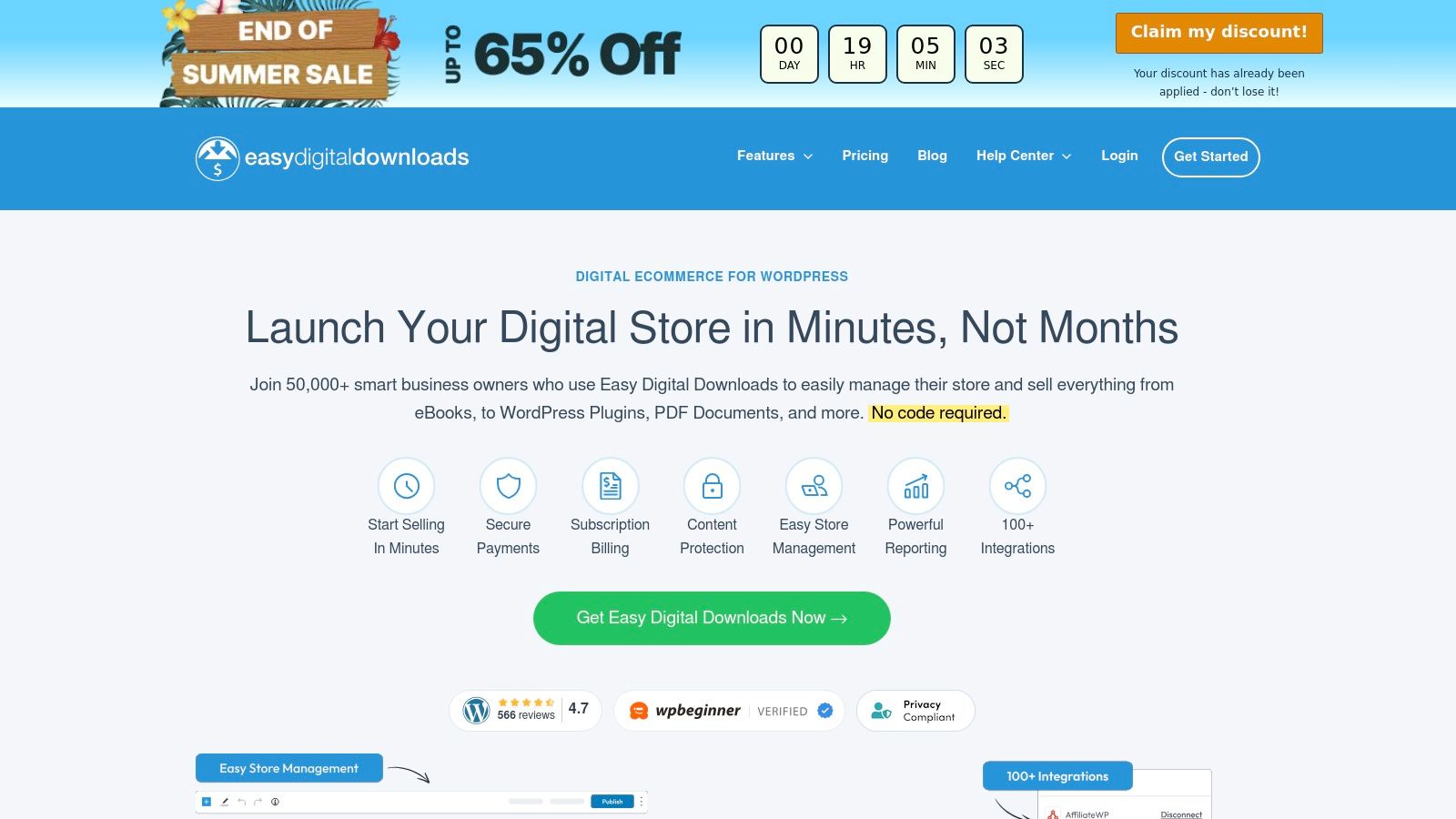
The platform's core strength lies in its ecosystem of official extensions, which handle everything from software licensing and recurring subscriptions to front-end submissions for building a full digital marketplace. While the core plugin is free, unlocking its true potential often requires investing in bundled extension plans. You can learn more about how Easy Digital Downloads (EDD) compares to other platforms in our detailed analysis.
Key Features & Assessment
- Digital-First Functionality: Core features are designed for digital products, including file download management, license key generation, and customer account areas.
- Official Extension Marketplace: A robust library of first-party extensions ensures seamless integration and reliable support for features like subscriptions, software updates, and multi-vendor marketplaces.
- Developer Friendly: The plugin is lightweight and built with clean, extensible code, making it a favorite among developers who need to customize store functionality.
Pros:
- Purpose-built and optimized for selling digital goods.
- Lighter and often faster than all-purpose e-commerce plugins.
- Excellent ecosystem of officially supported first-party extensions.
Cons:
- Not suitable for selling physical products without significant add-ons.
- Bundled plans can be a costly investment if you only need one or two premium features.
- Less built-in functionality out-of-the-box compared to WooCommerce.
Website: https://easydigitaldownloads.com/
6. MemberPress
For businesses selling exclusive content, courses, or digital products on a subscription basis, MemberPress is a leading all-in-one solution. It transforms a standard WordPress site into a powerful membership platform, allowing you to create paywalls, manage recurring subscriptions, and control access to your premium content with granular precision. This makes it one of the best WordPress plugins for ecommerce when the primary product is access rather than a physical item.
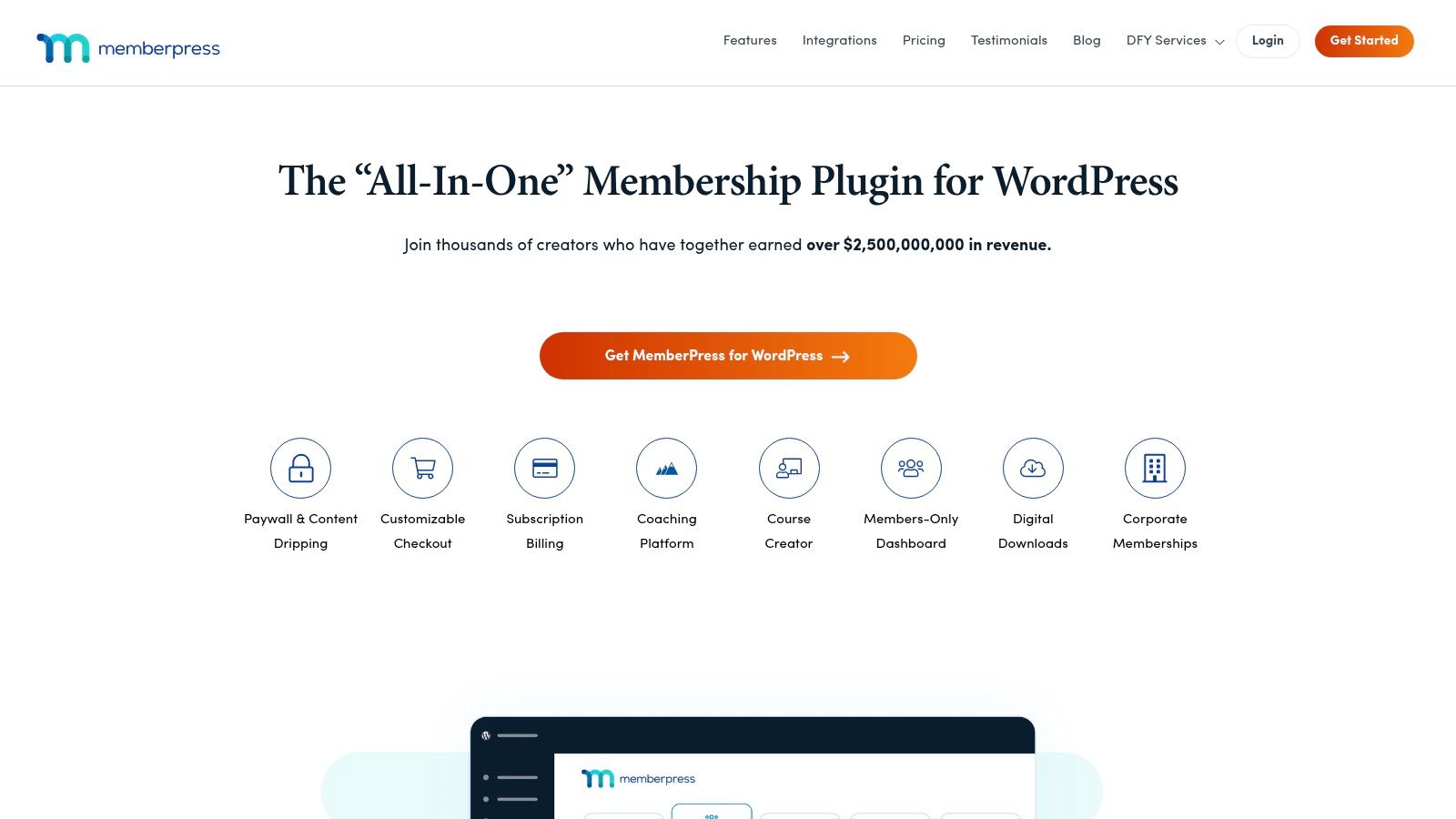
Its core strength lies in its ability to restrict access to pages, posts, custom post types, and even specific files, all based on membership levels. MemberPress simplifies the complex process of managing paying members by integrating payment gateways, handling subscriptions automatically, and providing detailed reporting without needing multiple disparate plugins. The built-in course builder further extends its value, letting you create and sell online courses within the same ecosystem.
Key Features & Assessment
- Granular Access Rules: Set up sophisticated rules to protect your content and implement content dripping to release it over time.
- Built-in Subscriptions: Handles recurring payments, user sign-ups, and checkout processes without relying on an external e-commerce plugin.
- Course Builder: Includes an integrated learning management system (LMS) for creating, managing, and selling online courses.
Pros:
- All-in-one membership platform robust for paid content.
- Strong reputation and long-standing product history.
- Extensive add-ons and integrations with popular services.
Cons:
- Premium pricing levels can be a significant investment.
- Some key integrations require higher-tier plans.
- Needs careful configuration to avoid unpaid registrations.
Website: https://memberpress.com/
7. YITH (YITH WooCommerce Plugins)
YITH is a leading independent developer offering one of a largest suites of premium WooCommerce extensions. Their ecosystem is designed to help store owners add powerful features like wishlists, gift cards, subscriptions, and advanced product filtering without relying on dozens of different vendors, which often leads to compatibility headaches. This single-source approach makes it a go-to for serious e-commerce businesses.
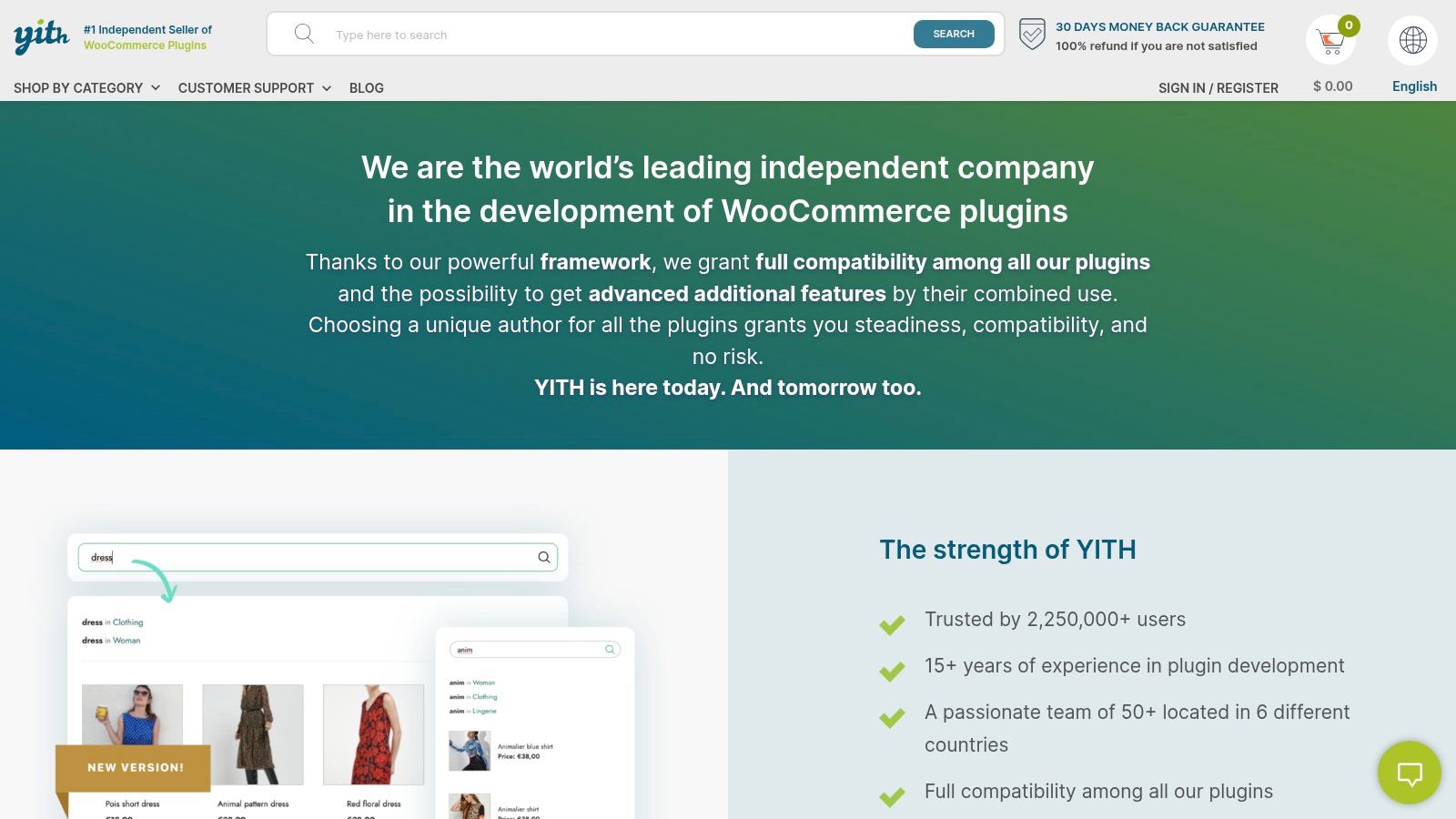
The primary advantage of the YITH framework is interoperability. Because the plugins are built by the same team, they are designed to work seamlessly together, reducing the risk of conflicts that can break your site. For anyone looking for the best WordPress plugins for e-commerce that offer both depth and reliability, YITH provides a cohesive and well-supported toolkit for scaling a WooCommerce store effectively.
Key Features & Assessment
- Broad Catalog: Offers a huge range of plugins for everything from cart recovery and affiliate marketing to booking and appointment systems.
- Unified Framework: All plugins are designed to integrate smoothly with each other, creating a stable and powerful e-commerce environment.
- Regular Updates: YITH consistently updates its products to ensure compatibility with the latest versions of WordPress and WooCommerce.
Pros:
- A single vendor for many store needs reduces plugin conflicts.
- Mature, well-documented, and widely used products.
- Excellent for adding specific, conversion-focused features.
Cons:
- Annual licensing costs can become expensive if you need multiple plugins.
- Primarily focused on WooCommerce, offering limited utility for other platforms.
- Some advanced features are only available in their premium club membership.
Website: https://yithemes.com/
8. Barn2 Plugins
Barn2 Plugins is a specialized developer offering a suite of premium plugins designed to solve specific user experience challenges in WooCommerce. They focus on improving how customers find and interact with products through features like advanced product tables, quick order forms, and enhanced product options, moving beyond a standard grid layout.
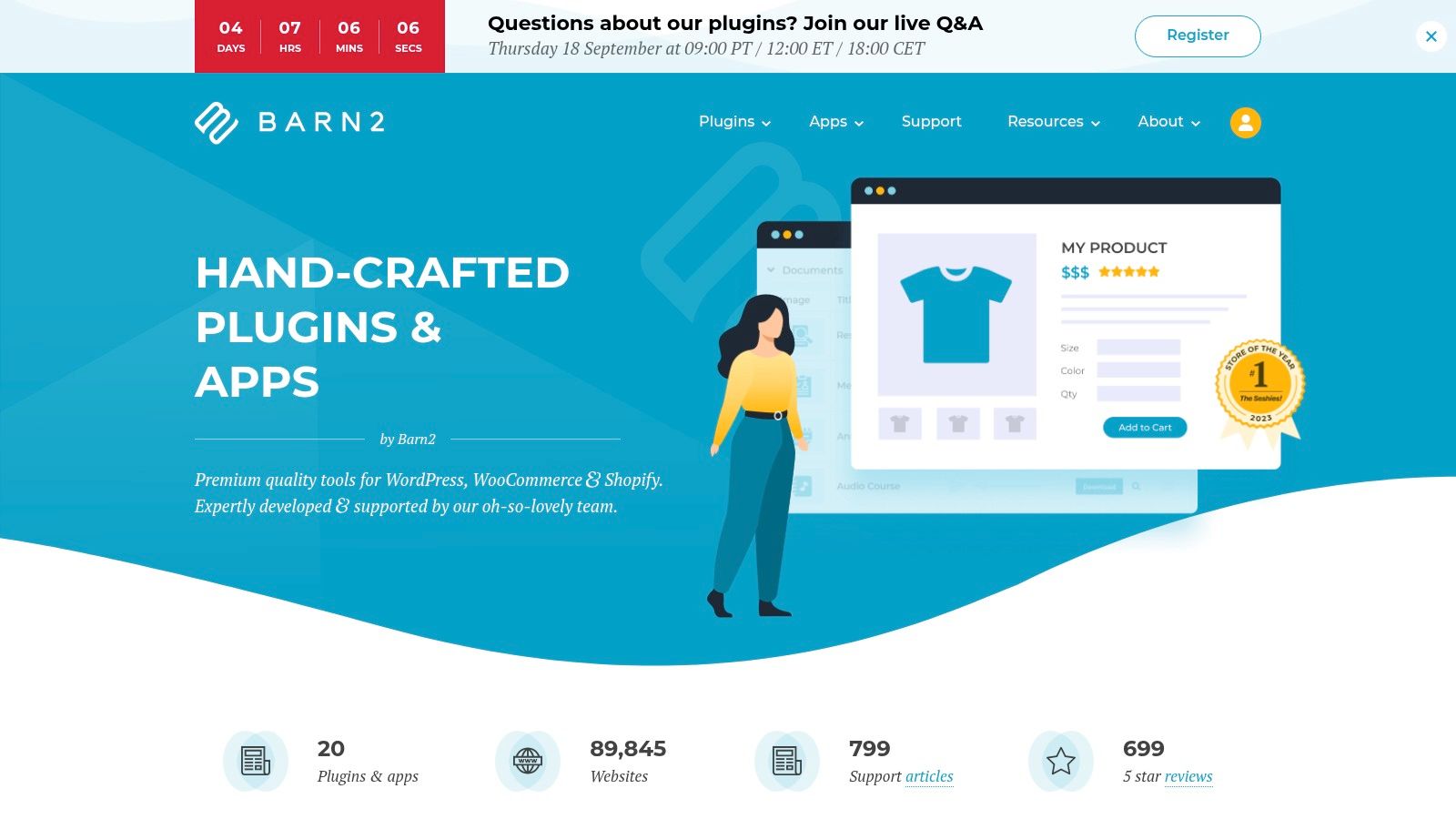
Their value proposition lies in creating highly functional, performance-oriented solutions for stores with large or complex catalogs, such as wholesale or B2B sites. By focusing on niche problems, Barn2 delivers some of the best WordPress plugins for e-commerce when you need to improve product visibility and simplify the bulk ordering process, directly impacting conversion rates for specific business models.
Key Features & Assessment
- Niche Functionality: Plugins like WooCommerce Product Table and WooCommerce Product Options directly address common UX pain points not covered by core WooCommerce.
- Performance-Oriented: Their tools are built with performance in mind, ensuring that even large product catalogs with complex filtering can load quickly.
- Excellent Documentation: Barn2 provides extensive tutorials, documentation, and use-case guides, making implementation straightforward for developers and store owners.
Pros:
- Expertly solves specific e-commerce UX issues (e.g., bulk ordering).
- Well-maintained plugins with strong customer support and clear documentation.
- Ideal for wholesale, B2B, and large-catalog retail stores.
Cons:
- Premium pricing reflects its specialized nature.
- Tightly focused catalog; you'll need other vendors for payments or shipping.
- May be overly specific for simple, small-scale shops.
Website: https://barn2.com/
9. PluginHive
PluginHive specializes in solving complex shipping logistics for WooCommerce stores, particularly for businesses relying on major U.S. carriers. They offer a suite of plugins that automate shipping processes, from displaying live rates at checkout to printing carrier-certified labels and providing real-time tracking information. This focus on deep integration with services like USPS, UPS, FedEx, and DHL makes it a powerful operational tool.

Its core value is streamlining fulfillment. Instead of manually entering order details into carrier websites, PluginHive lets you print labels directly from your WordPress dashboard, a critical time-saver for stores with growing order volumes. This makes their solutions some of the best WordPress plugins for e-commerce for merchants who handle physical product shipping in-house and need to reduce manual labor while improving accuracy.
Key Features & Assessment
- Live Carrier Rates: Automatically displays accurate shipping costs from multiple carriers at checkout based on cart weight, dimensions, and customer location.
- Built-in Label Printing: Generate and print official, carrier-certified shipping labels in bulk directly from the WooCommerce orders page.
- Live Tracking Notifications: Provides customers with automated tracking updates, reducing "where is my order?" support inquiries.
Pros:
- Strong focus on U.S. carrier automation simplifies complex shipping workflows.
- Support and onboarding assistance are available to help with initial setup.
- Tiered plans are designed to scale with your store's order volume.
Cons:
- Setup can be complex, with potential latency issues in fetching rates.
- The monthly or annual SaaS-style pricing can become more expensive than a one-time fee over the long term.
Website: https://www.pluginhive.com/
10. WP Desk
WP Desk is a specialized vendor focused on solving the operational and logistical challenges of running a WooCommerce store. While many plugins focus on marketing or payments, WP Desk provides a suite of powerful tools designed to streamline the behind-the-scenes work of shipping, fulfillment, and checkout customization. They offer a catalog of individual plugins and cost-effective bundles to enhance store management.
The primary strength of WP Desk lies in its granular control over complex processes. Their Flexible Shipping plugin, for example, allows for highly specific, table-rate shipping rules based on weight, cart total, or item count. This level of detail makes their offerings some of the best WordPress plugins for e-commerce stores with sophisticated fulfillment needs, moving beyond the basic options included with WooCommerce core. These tools integrate deeply with the checkout process, which is a critical area to optimize alongside your payment gateway configuration.
Key Features & Assessment
- Flexible Shipping & Logistics: Offers advanced, rule-based shipping calculations, live rates from carriers like UPS and DPD, and tools for creating shipping labels.
- Checkout & Product Field Customization: Allows store owners to add, edit, or remove fields from the checkout page and add custom fields to products for personalization.
- Bundled Plugin Suites: Provides comprehensive bundles that group together multiple plugins for shipping, invoicing, and store operations at a discounted price.
Pros:
- Broad toolkit that covers shipping, labeling, and checkout optimization.
- Reasonable pricing on bundles compared to buying plugins individually.
- Solves complex, real-world e-commerce logistical problems.
Cons:
- Pricing is listed in GBP, so USD conversion and taxes may require confirmation.
- Achieving a specific workflow sometimes requires combining multiple plugins.
- Focus is primarily on operational efficiency rather than marketing or design.
Website: https://wpdesk.net/
11. WebToffee
WebToffee specializes in creating robust operational plugins that fill common gaps in a standard WooCommerce setup. Their suite of tools focuses on essential back-office tasks like generating invoices, creating packing slips, managing gift cards, and offering store credit. This makes them a go-to source for store owners looking to streamline fulfillment and administrative workflows without relying on a single, monolithic plugin.
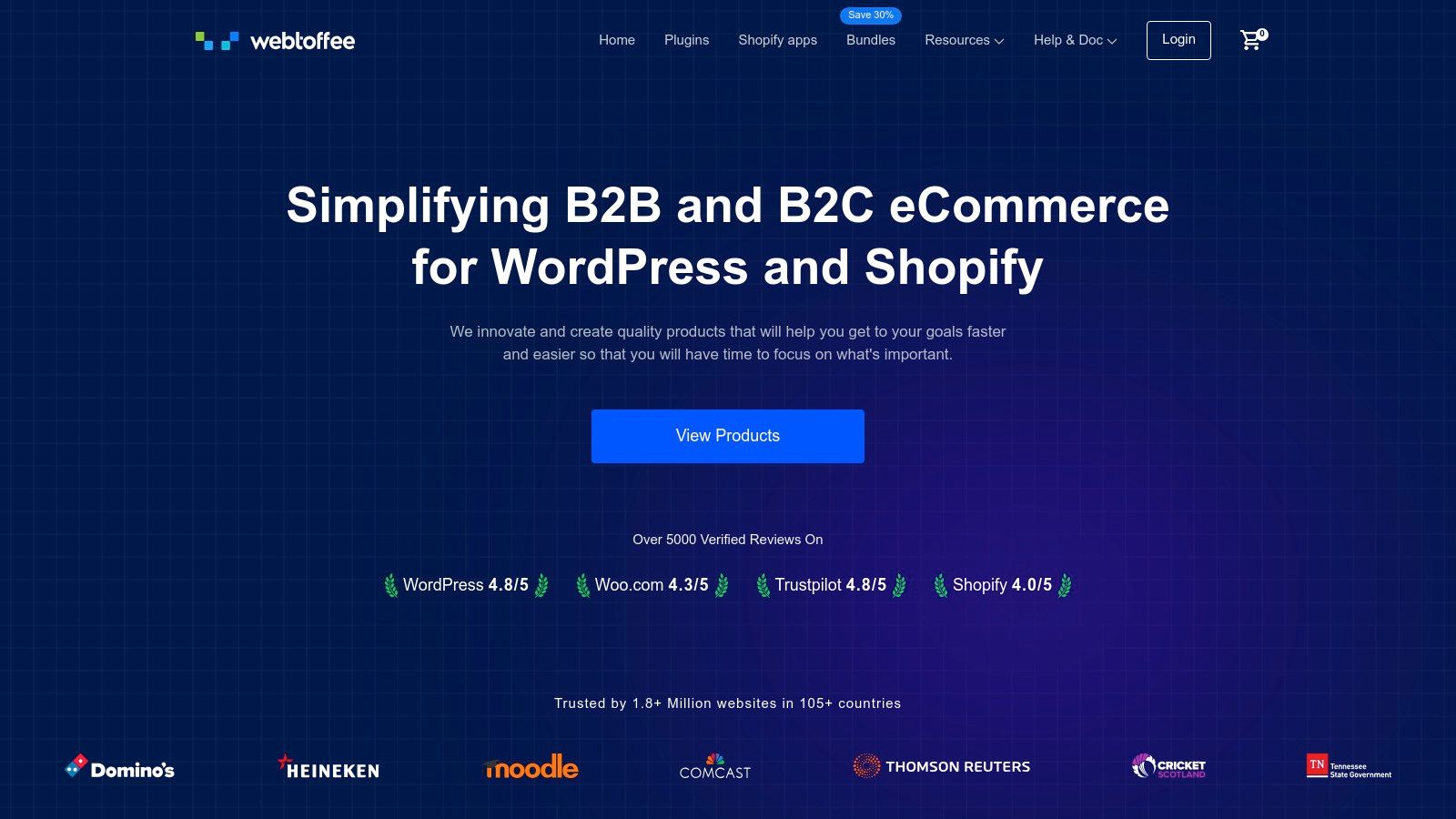
The primary advantage of WebToffee's offerings is their focused functionality and detailed documentation. Instead of trying to do everything, each plugin solves a specific operational problem effectively. This approach makes them one of the best WordPress plugins for e-commerce providers for stores that need reliable, specialized tools for order management and customer retention.
Key Features & Assessment
- Robust PDF Invoicing: Offers highly customizable templates for professional PDF invoices, packing slips, and shipping labels that are crucial for order fulfillment.
- Sales & Operational Utilities: Provides a wide selection of plugins for gift cards, product recommendations, and advanced coupon management to support sales strategies.
- Clear Documentation: Each plugin is supported by detailed walkthroughs and clear instructions, simplifying setup and configuration for store managers.
Pros:
- Excellent documentation and detailed feature guides.
- Great value for essential, frequently needed operational features.
- Plugins are focused, solving specific problems well.
Cons:
- Requires purchasing multiple separate plugins for related features.
- Advanced customization may require additional add-ons or custom code.
- The cost can add up if you need several of their solutions.
Website: https://www.webtoffee.com/
12. G2 (WooCommerce Reviews and Alternatives)
G2 is an essential research platform for anyone serious about building a scalable and reliable e-commerce store. Rather than being a marketplace, it’s a B2B software review site that provides verified, in-depth user feedback on WooCommerce and its ecosystem. This resource is invaluable for moving beyond marketing copy to understand real-world performance, plugin conflicts, and long-term maintenance challenges.
The platform’s strength is its detailed, context-rich reviews from actual users, often specifying their company size and role. This helps you find the best WordPress plugins for e-commerce by filtering feedback relevant to your own business needs, such as how a plugin performs in a high-traffic environment versus a small startup. It’s a crucial step for pre-purchase validation and anticipating potential scalability issues.
Key Features & Assessment
- Verified User Reviews: Access feedback from real users, complete with their role, industry, and use case for added context.
- Pros/Cons Summaries: Each review includes structured pros and cons, allowing for quick assessment of a plugin's strengths and weaknesses.
- Comparative Intelligence: Directly compare WooCommerce and its add-ons against competing platforms and plugins to inform your technology stack decisions.
Pros:
- Provides honest, real-world feedback on performance and scalability.
- Helps identify potential plugin conflicts and hosting impacts.
- Free to access and read all user reviews.
Cons:
- Not a marketplace; you cannot download or purchase plugins directly.
- Review quality can vary based on the user's technical expertise.
- Insights are based on other users' specific setups, which may not match your own.
Website: https://www.g2.com/products/woocommerce/reviews
Top 12 WordPress Ecommerce Plugins Comparison
| Item | Core Features / Capabilities | User Experience & Quality ★ | Value & Pricing 💰 | Target Audience 👥 | Unique Selling Points ✨ |
|---|---|---|---|---|---|
| Divi Areas Pro | Advanced popups, fly-ins, mega menus, WooCommerce integration | ★★★★☆ Premium, steep learning curve | 💰 Premium plugin, high value | Designers, developers, marketers | 🏆 Deep WooCommerce e-com triggers, extendable API |
| WordPress.org Plugin Directory | Free plugins, one-click installs, reviews & updates | ★★★☆☆ Variable quality | 💰 Free | All WordPress users | ✨ Official directory, transparent reviews |
| WooCommerce.com Marketplace | Official vetted WooCommerce extensions & themes | ★★★★☆ High compatibility | 💰 Mid-High, annual renewals | WooCommerce store owners | 🏆 Quality assurance, centralized support |
| CodeCanyon (Envato Market) | Large plugin catalog, frequent discounts | ★★★☆☆ Varies by vendor | 💰 Often lower upfront price | Developers & budget-conscious | ✨ Wide variety, one-time licenses |
| Easy Digital Downloads (EDD) | Digital goods focus, licensing, subscriptions | ★★★★☆ Specialized & lightweight | 💰 Bundled paid plans | Digital product sellers | 🏆 Tailored for digital stores |
| MemberPress | Membership, subscriptions, courses | ★★★★☆ Robust & established | 💰 Premium pricing | Membership site owners | 🏆 All-in-one membership & paywall system |
| YITH WooCommerce Plugins | Wishlists, subscriptions, AJAX filters | ★★★★☆ Mature & widely used | 💰 Annual licensing | WooCommerce store owners | ✨ Single vendor suite covering many needs |
| Barn2 Plugins | Product tables, options, quick order forms | ★★★★☆ Niche expert & well-documented | 💰 Premium niche pricing | WooCommerce store catalogs | ✨ UX-focused catalog & product handling |
| PluginHive | Shipping & payment automation (US carriers) | ★★★★☆ Strong US carrier support | 💰 SaaS pricing, scalable plans | WooCommerce stores (US focus) | 🏆 Multi-carrier live rates & label printing |
| WP Desk | Shipping, checkout fields, labeling, refund management | ★★★★☆ Broad toolkit & reasonable price | 💰 Bundle pricing | WooCommerce operational users | ✨ Wide operations extensions bundle |
| WebToffee | Invoices, packing slips, gift cards | ★★★★☆ Good docs & value | 💰 Multiple plugins needed | Store operators & admins | ✨ Operational store utilities |
| G2 (Reviews & Alternatives) | Verified reviews, pros/cons, star ratings | ★★★★☆ Real-world feedback | 💰 Free user insights | All WooCommerce users | ✨ Comparative intelligence, user role insights |
Building Your Perfect Ecommerce Tech Stack
Navigating the vast landscape of WordPress ecommerce can feel overwhelming, but building a high-performing online store is about strategic selection, not just accumulation. The journey from a basic setup to a conversion-optimized machine is paved with specialized tools. As we've explored, the best WordPress plugins for ecommerce aren't a one-size-fits-all solution; they are a curated collection of solutions tailored to your unique business challenges and goals.
The core takeaway is to think of your website not as a single entity but as a dynamic "tech stack." Your foundation might be solid with WooCommerce, but true power comes from layering on specialized functionality. You might use PluginHive to solve complex shipping logistics, Barn2 to create a lightning-fast product table for B2B clients, or MemberPress to build an exclusive, revenue-generating community around your products.
Your Actionable Next Steps
To move from information to implementation, start with a clear audit of your current store. Don't simply install a plugin because it sounds good; diagnose your specific pain points first.
- Identify Your Biggest Bottleneck: Is it cart abandonment, low average order value, or confusing shipping options? Pinpoint the single biggest issue costing you sales. For instance, if customers are leaving without buying, a tool like Divi Areas Pro can help you deploy targeted exit-intent popups to recover that revenue.
- Prioritize the Customer Experience (CX): Look at your store from a buyer's perspective. Is it easy to find products? Is the checkout process seamless? Plugins from YITH or WebToffee can drastically improve filtering, wishlists, and checkout flows, leading directly to higher satisfaction and conversion rates.
- Balance Features with Performance: Remember that every plugin adds code to your site. Before committing, consider the plugin's impact on site speed and its compatibility with your existing tools, especially your theme and page builder. Always test new additions on a staging site to prevent conflicts.
Building for Growth and Scalability
Ultimately, your goal is to construct an ecommerce ecosystem that is both powerful today and scalable for tomorrow. This means choosing plugins from reputable developers with excellent support and a proven track record, like those found on the official WooCommerce Marketplace or from established vendors like WP Desk. This ensures your tools will grow with you, receiving timely updates and remaining compatible with WordPress core changes.
The right combination of plugins transforms a standard WordPress site into a formidable ecommerce engine. By carefully selecting tools that solve specific problems, enhance the user journey, and streamline your backend operations, you're not just adding features; you're building a sustainable, profitable, and efficient online business.
Ready to unlock a new level of marketing and user experience on your Divi ecommerce site? The tools at Divimode are built to integrate seamlessly with your stack, providing the popups, conditional logic, and dynamic content features you need to convert more visitors into loyal customers. Explore our powerful Divi extensions at Divimode and start building a smarter, more effective store today.
